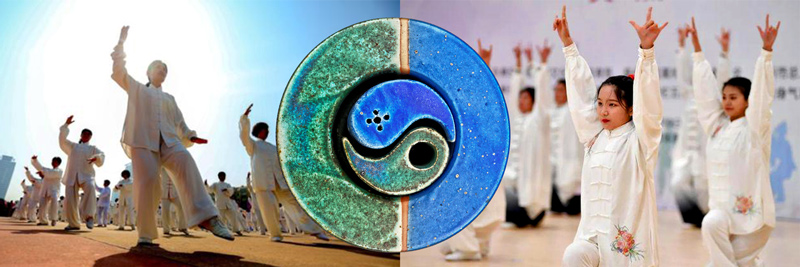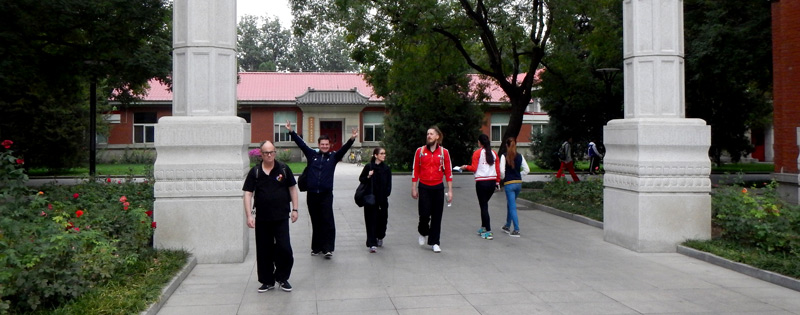Qigong: A Guide to Understanding the Many Paths of Energy Cultivation
Peter Eves - Friday, March 14, 2025
In the bustling modern world where stress seems constant and disconnection from our bodies common, ancient practices like Qigong offer a pathway back to balance. Yet many newcomers to this practice quickly discover that “Qigong” isn’t just one thing—it’s a rich tapestry of traditions, each with its own focus and benefits.This guide explores the diverse landscape of Qigong practices, helping you understand the unique characteristics and purposes of each major type. Whether you’re seeking better health, spiritual growth, or martial ... read more
The Power of the Mind in Qigong: How Mindset can Improve your Practice
Peter Eves - Tuesday, April 18, 2023
Qigong is a powerful mind-body practice that has been used for centuries to promote health and well-being. While physical movements and exercises are an important part of Qigong, the practice also places a strong emphasis on the power of the mind. In fact, mindset is a key component of Qigong that can help to enhance the effectiveness of the practice and promote greater physical, emotional, and spiritual well-being.This article explores the power of the mind in Qigong and how mindset ... read more
The Year of the Water Rabbit - The Embodiment of Tai Chi and Qigong
Tara Brayshaw - Saturday, January 14, 2023
The much anticipated Year of the Water Rabbit has finally arrived. We can all breathe deeply in the knowledge that the Rabbit is a symbol of longevity, peace and prosperity. More importantly, 2023 is predicted to be a year of hope for all.The Rabbit is the fourth animal in the Chinese Zodiac cycle. According to the fable of the animals, the Jade Emperor’s Great Race saw them all having to race across a wide river to vie for a position ... read more
Foundation: Where Tai Chi, Qigong and Science Fiction Intersect
Tara Brayshaw - Monday, January 17, 2022
“The search for meaning is not always about the answer. It is the process of seeking that also enlightens.” – Demerzel in “Foundation – The Television Series” based on the books by Isaac AsimovFor most people, their Tai Chi or Qigong journey commences because of a desire to improve their physical and/or mental health. At this stage they know little more other than the raft of health benefits, or they saw an ad for classes and thought it might be ... read more
Five Element Theory and Qigong – Five what?
Peter Eves - Saturday, September 18, 2021
Qigong has its origins amidst the creation of Traditional Chinese Medicine and Taoist thought and philosophy. Most will have heard mention of Yin Yang in relation to our Qigong and Taijiquan, and if not, at least in relation to the Chinese culture.The Yin Yang dates back more than 500 BCE in ancient China, but a lesser-known concept, which had its origin around this time, was the Five Elements, now referred to as The Five Elements Theory. Yin Yang Theory is ... read more
The Importance of Breathing Correctly
Peter Eves - Monday, March 15, 2021
As a healthcare practitioner for over 26 years, I am well placed to observe clients/patients breathing patterns. One thing has become obvious over that time and it is the fact that most people now seem to have a baseline of chronic stress that has become normalized. I observe this in their; demeanour, muscle tension, speed of speech, symptoms reported and most importantly, by how rapid and shallow their breathing has become. This breathing pattern has become their set point i.e., ... read more
What is this Thing Called Qi?
Peter Eves - Tuesday, February 23, 2021
In your first class at JinLi-Wushu Tai Chi you will hear the word “Qigong”. A brief explanation usually follows. The word “Qigong” has two parts to it; firstly ‘Qi’ which is briefly described as vital energy or sometimes life force (and the topic of our discussion); secondly the word ‘gong’ meaning work, skill, labour, cultivation, or effort. So loosely translated, Qigong means energy work/skill. More specifically Qigong (pronounced “chee-gung” and sometimes spelt ‘chi-kung’), is translated from Chinese to mean “Energy ... read more
What is the Difference between Taijiquan and Qigong?
Peter Eves - Thursday, February 18, 2021
Many people come to class and ask the question, “What is the difference between Taijiquan (Tai Chi) and Qigong?” This usually after first asking, what is ‘quee gong’ (qigong)? And the former is a great question.Many schools, like ours, teach Qigong as an integral part of Taijiquan training. Both are body-mind-breath exercises. Both involve gentle movement, good posture and integrating the breath with movements. But only one has a martial arts application. Both practices cultivate gentle and present mind focus. ... read more
Tai Chi and Qigong – A Good Night's Sleep is a Movement Away
Tara Brayshaw - Wednesday, May 22, 2019
Can’t Sleep? You aren’t alone.
Research by the Sleep Health Foundation, “Asleep on the Job: Counting the cost of poor sleep”, 2017 highlights that poor sleep is affecting 39% of Australian
adults that are regularly struggling with their sleep. The 2017 study found that the number of sleep problems among Australians are 5-10% higher than
when the Foundation published its first survey on sleep health in 2010. Sleep disorders contribute to diseases and injuries such as heart disease,
obesity, diabetes, ... read more
Back to Basics in Beijing (A Journey of Discovery with JinLi's Training in China 2017)
Tara Brayshaw - Saturday, October 21, 2017
Want to feel like a beginner again? Go and train in China.
Remember that night back when you started your Taiji journey? For most of us it happens somewhere around the fourth lesson. You finish a class feeling
like it’s all too much, you’re legs are aching, and a little voice in the back of your head is saying “maybe this isn’t for you”, but you push on because
you are going to crack this thing, no matter how ... read more
Recent Posts
- Qigong: A Guide to Understanding the Many Paths of Energy Cultivation
- The Year of the Wood Snake and Tai Chi/Qigong: A Harmonious Interplay
- An Introduction to the Six Harmonies in Taijiquan
- Tai Chi Lessons from a Broken Piano: Work with What You Have
- Tai Chi and Cage Fighting: Zhang WeiLi, China’s UFC Champion
- Studio 14 - The Launch of a Dream
- It’s The Year of the Wood Dragon – A Great Time to Dream Big
- The 21st WTQA Festival 2023 - My First Wushu Tai Chi Qigong Festival
- Spreading the Word: Presenting the Benefits of Qigong and Tai Chi to Probus Members
- Fortune, Sex, and a Good Death: The Bat in Chinese Symbology
Tags
Archive
- March 2025 (1)
- January 2025 (1)
- November 2024 (1)
- September 2024 (1)
- July 2024 (1)
- January 2024 (2)
- December 2023 (1)
- September 2023 (1)
- June 2023 (2)
- April 2023 (1)
- January 2023 (2)
- November 2022 (1)
- August 2022 (1)
- March 2022 (1)
- January 2022 (2)
- September 2021 (1)
- May 2021 (1)
- March 2021 (1)
- February 2021 (2)
- January 2021 (1)
- December 2020 (1)
- August 2020 (1)
- April 2020 (1)
- January 2020 (1)
- October 2019 (1)
- May 2019 (2)
- April 2019 (1)
- March 2019 (3)
- February 2019 (2)
- January 2019 (3)
- December 2018 (2)
- October 2018 (1)
- July 2018 (1)
- June 2018 (1)
- April 2018 (2)
- February 2018 (1)
- October 2017 (1)
- September 2017 (1)
- April 2017 (2)
- March 2017 (1)
- January 2017 (2)
- December 2016 (2)
- October 2016 (1)
- September 2016 (1)
- August 2016 (1)
- July 2016 (2)
- June 2016 (21)










